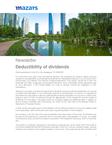
Deductibility of dividends
Deductibility of dividends
For some time now, part of the international doctrine has sustained the need to initiate a serious analysis on the possibility of converting the dividend into a deductible expense. Thus, the author Amir Chenchinski, in his articles "The Case for Dividend Deductions" (Tax Lawyer, Vol 65. No.1) and "The Road Not Yet Taken: Integration and Dividend Deduction" (Univ. of Michigan, 2004) opened the way for such discussion in the United States as a way to achieve income tax integration in U.S. corporations.
Although in principle it could be thought that the dividend -being the effective distribution of a benefit or profit to the associates- is not a necessary expense for the production of income, it is important to reconsider this assumption under the understanding that the associates are long-term investors who expect a return on their investment through the appreciation of the investment and the receipt of dividends. For this reason, the equity accounts (including capital and additional paid-in capital), as well as those of liabilities with third parties, are (both) on the right side of the Balance Sheet or Statement of Financial Position.
In other words, the equity is part of the liabilities, with the difference that it is a long-term liability owed to the associates, which will be paid upon total or partial liquidation of the company,
the company, once the rest of the external liabilities have been paid. In this sense, the dividend can be seen as the payment of a financial return to the associates, subordinated -of course- to multiple circumstances (such as that the company has profits in the respective fiscal year, that it is decreed, etc.).
This position is indirectly recognized in Colombia by corporate law, when Article 149 of the Code of Commerce establishes that the Colombian corporation, while it is in the pre-operative stage, may pay interest to its members on the capital invested. In this sense, if the corporate law itself considers that the corporate contribution is, ultimately, a long-term loan for which it is reasonable that interest be paid, there should be no opposition to the recognition of the deductibility of the dividend as interest by the tax legislation.
In Colombia there is no general prohibition for the deductibility of dividends. Only since the issuance of Law 1819 of 2016 there was an allusion to this phenomenon by establishing in Article 61 numeral 2 thereof that "Expenses that do not meet the requirements established in this statute for their deduction in the income tax and complementary taxes, will generate permanent differences. Such expenses include, among others (...) c) dividend distributions". This rule, far from prohibiting outright the deductibility of the dividend, what it does is to indicate that when the distribution of dividends does not comply with the requirements to be deductible, it cannot be taken as a deduction.
This could not be understood in any other way, since there are several special rules (some labor, others corporate and others tax) that allow the deductibility of the dividend in certain specific circumstances. If it were understood that this rule prohibits outright the deductibility of the dividend, it would have to be concluded that an organic derogation would operate on the other special rules, which does not make sense since some of them were created by the same tax reform established in Law 1819 of 2016.
Thus, the dividend is deductible for the paying entity when it is distributed in shares among the workers of a company (Law 789 of 2002, article 44), or when it is paid to the holders of preferred shares (Law 1819 of 2016, article 35) case in which the same is treated as a financial liability and, under such considerations it will be deductible, or when a profit is distributed to the hidden participant in the framework of a joint venture account contract (collaboration contract governed, by remission, by the rules of corporate law) or, as said, when the company, being in preoperative stage, pays interest on the capital contributed.


